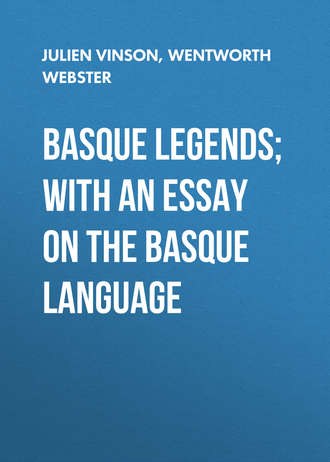 полная версия
полная версияBasque Legends; With an Essay on the Basque Language
185
An exception is occasionally made in the case of the “Satans,” as the part is almost too fatiguing for girls.
186
This little wand plays an important part of its own. In many of its uses it resembles the Caduceus of Mercury; a touch from it renders invisible, puts to death, or restores to life at the will of the Satanic possessor. It appears also as given to the hero in many of the “Legends;” cf. pp. 34, 35, above.
187
This MS. was kindly lent by M. J. Vinson, to whom we have been so often indebted.
188
Ercilla, the author of the “Araucana,” was however of Basque blood, and Basque names occur frequently among the poets and dramatists of Spain, especially in recent years.
189
The claim put forth in the “Revista Euskara,” p. 61, April, 1878, may be fully conceded:—”Si; éste es el carácter distintivo de la poesía euskara; su exquisita moralidad. Jamás se encuentra en ella nada que se parezca, ni á una apología del vicio, ni á una excusa del crimen.”
190
“Cancionero Vasco, acompañado de traducciones castellanas, juicios criticos,” etc., por José Manterola. San Sebastian. 1877–8. Serie I., 2, p. 39.
191
Ibargüen’s words after quoting the song are: “Por este órden referidas yba este cantar contando toda esta historia que habemos dicho atrás en este capítulo de las guerras ceviles que en cinco años Octaviano Cesar Augusto hizo en esta Provincia Cantábrica, y aunque esta hereciat (historical song) tenga otros muy muchos versos rodados tan solamente dellos he tomado los diez e seis primeros, porque los demas estaban carcomidos, y los pongo aquí para el que fuere bascongado, contentándome con solo ellos ebitando largueza importuna de los demás, que el pergamino está muy roñoso e viejo,” cited in the “Cancionero Vasco,” 2, iii., pp. 4, 5.
192
Cf. Alexandre Dihinx in the Impartial de Bayonne, in 1873. These articles have been reprinted by M. J. Vinson in L’Avenir de Bayonne, May, 1878.
193
“The master of the house,” the usual respectful address to a Basque proprietor of any rank. His wife is “Etcheco Anderea,” “The mistress of the house.”
194
Altabiscar is the mountain on the East, Ibañeta that on the West of the supposed scene of conflict.
195
Altabiscar is the mountain on the East, Ibañeta that on the West of the supposed scene of conflict.
196
Of course it ought to be “vultures.” The Basque is distinctly “eagles;” an error which no Basque shepherd could have made.
197
The use of rocks “is confirmed by the Basque ballad of Altabiscar, in which, however, there is no allusion to the powerful inducement of booty.”
198
There are other examples of similar mystification in later Basque literature. “Les Échos du Pas de Roland,” par J. B. Dasconaguerre, Bayonne, 1868, professes on the title to be “traduit du Basque”; but the “Atheko-gaitzeko Oiharzunak” (the echoes of the bad door or pass), Bayonan, 1870, is really a translation from the French. To the Basques the name of Roland is unknown in connection with this beautiful ravine. M. Fr. Michel’s “Le Romancero du Pays Basque,” Didot, Paris, 1859, is scarcely less an embroidery on themes of which the ground only is Basque.
199
An exact reprint of Echepare’s “Poems,” edited by M. Vinson, was published by Cazals, Bayonne, 1874.
200
The most curious fact to notice in these hymns is, how very soon after their death the Jesuit Fathers, Ignatius de Loyola and François de Xavier, were celebrated and addressed as saints in Basque verse.
201
For the most recent theory on the Cagots, see “Les Parias de France et de l’Espagne,” par M. de Rochas (Hachette, Paris, 1876).
202
Michel, “Le Pays Basque,” p. 352.
203
I owe the MS. of this song to the kindness of M. Achille Fouquier, author, sportsman, and artist.
204
Taken down by M. J. Vinson, February 21, 1874. Cf. “Proverbes du Pays de Béarn,” par V. Lespy (Montpellier, 1876), p. 84, for another song on “Little Peter” in Gascoun.
205
Cf. Fr. Michel, “Le Pays Basque,” p. 260. “Cancionero Vasco,” Series 2, iii., 82, etc.
206
From the MS. of M. A. Fouquier. This song took the prize at Urrugne, 1858.
207
The latest traveller in the Basque countries corroborates this. Major Campion writes, “I had no idea how fine were the old Basque songs, or, more correctly speaking, chants; some of them being perfectly charming.”—“On Foot in Spain,” by J. S. Campion, p. 73. (Chapman and Hall, 1879.)
208
These are to be obtained chez Ribaut, Pau, and the other booksellers at Biarritz and Pau.


